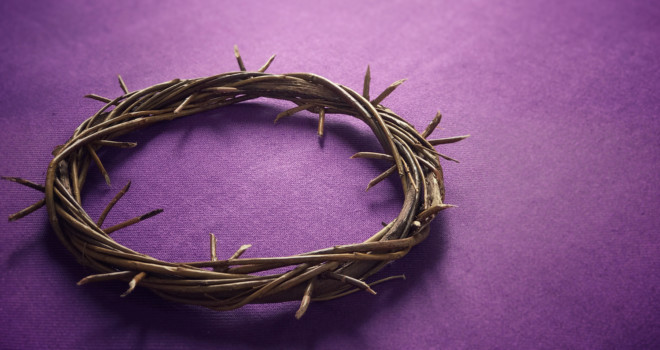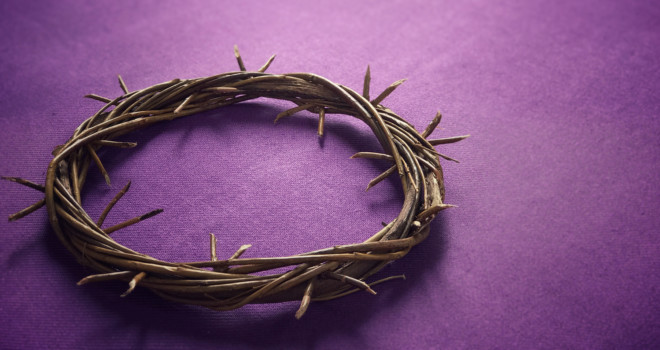In the last few months, Our Lord has taken me to my very limits physically, mentally, and spiritually. He took everything that I thought I possessed or controlled away from me. Being the spiritual infant that I am, I could not understand what He was doing. I grew frustrated and angry. I was sick, exhausted, heartbroken, and deeply wounded. As my health deteriorated, my relationships crumbled around me, and my family was struggling. I felt like I was standing in a barren wasteland and all of it left me dumbfounded.
When Lent began, and for weeks, all I heard in prayer was: “I’m calling you to endure this suffering with My Sorrowful Mother in union with Me on the Cross.” The answer I was being given was the Cross. That terrible, beautiful, agonizing instrument of love, redemption, and freedom. Truth be told, at first I didn’t want the Cross at all. I tried to flee. I cried. I yelled out at God. I fell into spiritual blindness and could not see the next step in front of me. Yet, this is precisely what I asked for. My husband reminds me frequently that I prayed from the depths of my heart to become a saint. This is what that path looks like. The path to sanctity is the Cross.
We are deeply wounded in ways we often aren’t aware of or understand until we commit fully to the spiritual life. In order for Christ to call us to holiness, we must descend into the darkness within us and the deepest wounds we carry. How He heals these wounds varies from person to person and is based on the mission He has given to us. It was during this time that Our Lord descended into the wounds I carry from pride, a desire for control, being unloved, and the very deep wound of rejection that I carry. All of these wounds result in fear within me, which destroys charity and keeps me from doing God’s will.
Interior mortification is considerably more agonizing than external suffering. It is why those who dismiss our Blessed Mother as a sentimental figure do not understand the depths of the sword that pierced her soul as Her Son died on the Cross. Interior wounding opens us up in ways that no surgery, injury, or illness can. These woundings leave us bare, vulnerable, and defenseless. They can only be united to Christ Crucified and His Sorrowful Mother. It is both at the foot of the Cross and crucified with Christ on the Cross that we find healing from the wounds of betrayal, rejection, hatred, and lack of love from others.
In order to walk this path, however, we must look to how Our Lord Himself handled the deep wounds that are caused by words, indifference, hatred, meanness, pride, envy, and a lack of charity. Oftentimes, as Christ is purifying and sanctifying us, we discover that when we are in our lowest moments physically, the people around us will seem to take on the place of the mob in the Passion narrative. The Cross in our lives brings out the absolute worst in others.
I never experienced this so clearly until I became sick and suffered utter hatred for months at the hands of someone I love dearly. A hatred born of fear, but that caused me levels of interior pain I didn’t know existed. I also experienced how easy it is for others to cast me off as if I am nothing, especially when the opinions of others incite fear. Rather than simply healing my fears of rejection and being unloved, Christ allowed me to confront it by experiencing it through an immense piercing at the hands of others while I also suffered physically.
I wasn’t prepared—none of us are except the saints—for all of this to come at me, but it was all for God’s greater glory. Christ had to heal these wounds within me and lead me to surrender to the Way of the Cross in all things in my life. To accept the loss of physical health in His time. To endure the scorn and abandonment of others. To embrace the deepest wound I carry, which is that of rejection. To respond to all of this in the same manner He does, which is through love. This is the path to holiness, and it is the path to freedom and joy.
As Our Lord led me out of spiritual darkness, I could once more see the holy mountain before me. I was able to stop and look out at the expansive horizon and see clearly the work of Christ in my life and in the lives of those around me. Somehow by His grace, I had been set free of so much of the fear I previously carried. In its place, I could see that it is God’s will that matters most in this life. That it is eternal things that ultimately are most important. Even the love and acceptance we desire from others must be placed after God’s will.
Last Thursday, I sat meditating on Mark’s Passion narrative before Our Lord’s Real Presence at Adoration. For the first time in my life, I experienced His surrender to the Father in the Spirit at a deep level. How Christ gave up all of His power, might, and glory in order to be handed over to sinners, to be tortured, and crucified. I have no power. None of us do. All we can do is submit to His holy will and do our part. Whether we are accepted, loved, or believed in, what we are called to do is not ultimately up to us. It is up to God. We must simply submit in obedience to what He asks of us and leave the rest to Him. This understanding frees our souls in tremendous ways.
From this place of surrender, we can joyfully walk the Way of the Cross. We can forgive those who deeply hurt us. We can accept the rejections we experience and even accept the false accusations, calumnies, gossip, and judgment of others. We can forgive the weaknesses of those who are hateful or flee when our suffering becomes great. When we are seeking to do God’s will, we will accept all of this in love and pray: “Father forgive them, for they know not what they do.”
Christ teaches us through His Passion that we must be willing to surrender to all that He allows to befall us in our lives, whether physical or spiritual. The more we surrender, the more we become defenseless. That is, we no longer seek to constantly protect our own ego—this takes grace and practice—because we understand the joy of union with Christ. We understand that it is God’s love that fills us up. In her book, On the Cross of Rejection, Servant of God Catherine Doherty writes:
“He comes with two words—meekness and rejection—showing us, I think, that if we are truly meek, we shall be defenseless, unfenced, open. A defenseless person is a trusting person, a meek person, a person full of faith with a heart like a child—of whom is the kingdom of heaven.
Defenseless people are open to all pains and all thrusts of the knives of other people’s words, glances, and deeds, because they are strong in faith and strong in love, because they don’t retaliate, don’t defend themselves. In a word, they are “meek.” They are not hurt, for the knives (such as harsh words and deeds) bounce off that terribilis shield and buckler of theirs, the one fashioned by faith, and fall at the feet of the attacker and the attacked.
From their hearts and souls stream light almost unbearable for they are truly Christ-like. The light of Christ shines for them, unimpeded, and envelopes the attacker with its gentle love, illuminates his soul, and heals him.”
The only way to become defenseless and to heal from the deep wounds we carry, is to enter into them. Often, it is to be rejected. To be hated, so we can answer Christ’s call to forgive. To be abandoned in our weakest, lowest, and sickest moments. To endure the scorn of others. Through all of this we are called to love as He loves. The true test of our willingness to love as Christ loves is by coming out of dark times with a forgiving heart that still wants to sacrifice, suffer, and give to others no matter the cost.
Being wounded, expands our capacity to love. It leads us to greater defenselessness and deeper union with Our Lord in His Passion. The Passion is the way to holiness. We cannot become saints without it. It is why I thank God for the darkness and agonies I endured, because without them, I wouldn’t be able to love a little more like Him going into this Sacred Triduum.
Oh, living flame of love
That tenderly woundest my soul in its deepest centre,
Since thou art no longer oppressive, perfect me now if it be thy will,
Break the web of this sweet encounter.Oh, sweet burn! Oh, delectable wound!
Oh, soft hand! Oh, delicate touch
That savours of eternal life and pays every debt!
In slaying, thou hast changed death into life.Oh, lamps of fire,
In whose splendours the deep caverns of sense
Which were dark and blind with strange brightness
Give heat and light together to their Beloved!How gently and lovingly thou awakenest in my bosom,
Where thou dwellest secretly and alone!
And in thy sweet breathing, full of blessing and glory,
How delicately thou inspirest my love!—St. John of the Cross
✠












